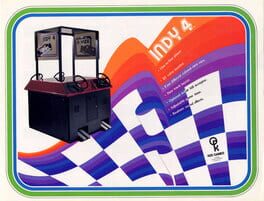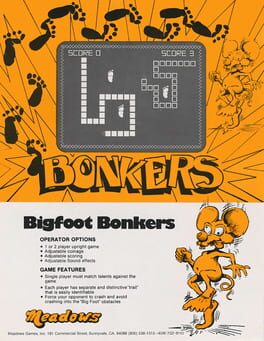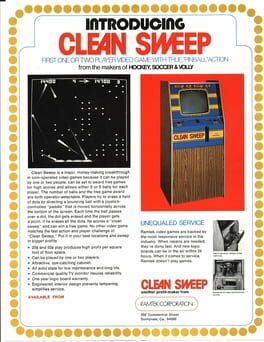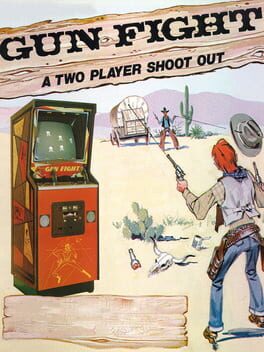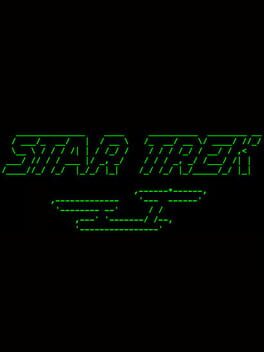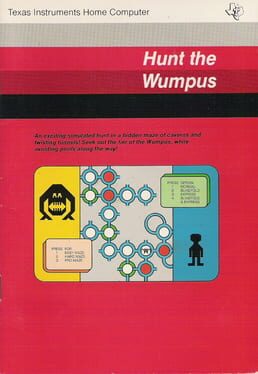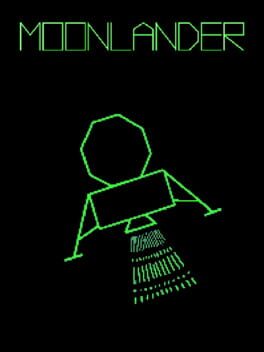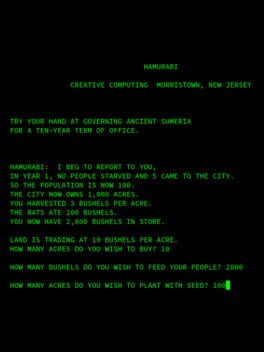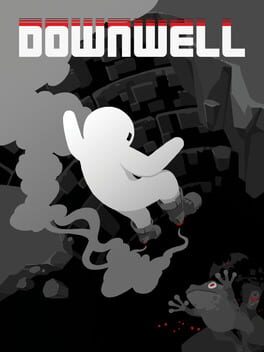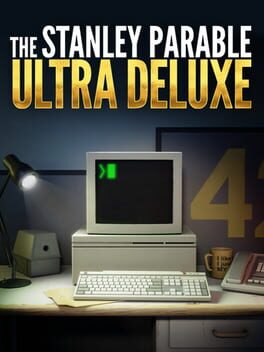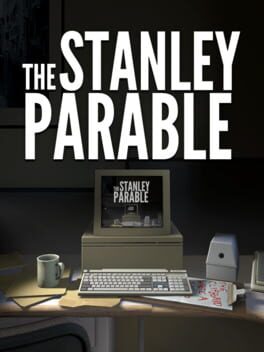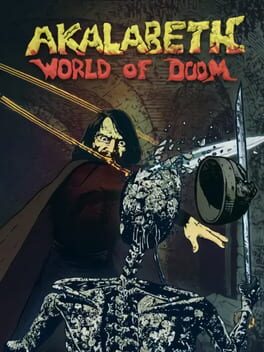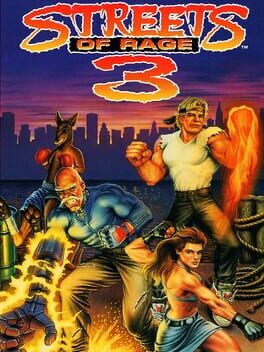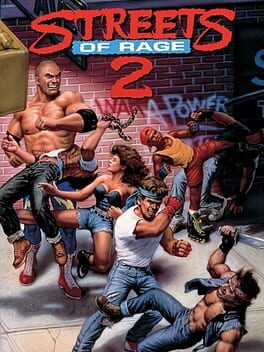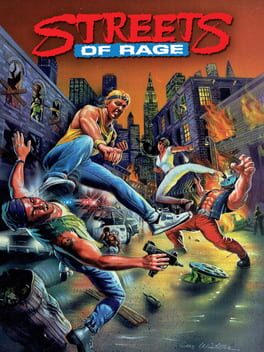1976
In many ways, this is the direct antecessor of Combat for the Atari 2600. A game set around the idea of making movement very envolving and getting accustomed to its quirks before the rival does. I really admire the work that went on to create this.
---------------------------------------------------------------------------
En muchos sentidos, es el antecesor directo de Combat para la Atari 2600. Un juego basado en un movimiento muy complejo y en tener que acostumbrarte a él antes de que lo haga el rival. Admiro el trabajo que tuvo que haber a la hora de concebir esto.
---------------------------------------------------------------------------
En muchos sentidos, es el antecesor directo de Combat para la Atari 2600. Un juego basado en un movimiento muy complejo y en tener que acostumbrarte a él antes de que lo haga el rival. Admiro el trabajo que tuvo que haber a la hora de concebir esto.
1976
1974
Nowadays, this is signaled as one of the first commercial "clones" in videogame history, as we understand them today, and serves as a fascinating glimpse into the artistic impulses that propelled early developers that attempted to outbeat a hit title in their own space (previously I said that game was Breakout, which was obviously wrong. The game that they were drawing inspiration from was obviously Pong). With that being said, the notion of "clone" itself entails a series of assumptions that one can't easily apply to this particular period so easily, and if anything, it's more of a testament to the fact that we are willing to categorize the past of the medium with modern, largely broad strokes. What I can say regarding Clean Sweep in particular, I think it's apparent that the impulse here orbited around filling the screen with more stuff to do, which doesn't stray too far away from the way in which we tend to distinguish original works from copy-cats today. It's usually not a fair optic, but it's also the way in which much gaming media operates, which is a problem when trying to discern what makes a particular work significant. Unfortunately, with this game in particular in particular I don't think there's that much value to extract from, as it gets boring pretty quickly.
---------------------------------------------------------------------------------------
A día de hoy, este juego se trata como uno de los primeros "clones" comerciales en la historia de los videojuegos, tal como se entienden hoy, y sirve como muestra del tipo de impulsos artísticos que impulsaban a desarrolladores a superar un título exitoso (antes dije que era Breakout, cuando obviamente se trataba de Pong). Dicho esto, la noción de "clon" en sí implica una serie de suposiciones que uno no puede aplicar tan fácilmente a este período, y en todo caso, es más una muestra de nuestra tendencia a categorizarlo todo con brocha gorda y adecuada a nuestras sensibilidades modernas. Lo que puedo decir de Clean Sweep en particular es que, a la hora de construir su espacio de juego, parece creer que la clave es llenar la pantalla con más cosas, lo que pensándolo bien es el tipo de elemento que mucha gente emplea para distinguir un original de la copia barata. Es una mirada que puede ser muy injusta y que en ocasiones nos impide observar los detalles particulares que hacen a una obra única. Desafortunadamente, con este juego se hace difícil extraer algo de valor, porque se hace aburrido muy deprisa.
---------------------------------------------------------------------------------------
A día de hoy, este juego se trata como uno de los primeros "clones" comerciales en la historia de los videojuegos, tal como se entienden hoy, y sirve como muestra del tipo de impulsos artísticos que impulsaban a desarrolladores a superar un título exitoso (antes dije que era Breakout, cuando obviamente se trataba de Pong). Dicho esto, la noción de "clon" en sí implica una serie de suposiciones que uno no puede aplicar tan fácilmente a este período, y en todo caso, es más una muestra de nuestra tendencia a categorizarlo todo con brocha gorda y adecuada a nuestras sensibilidades modernas. Lo que puedo decir de Clean Sweep en particular es que, a la hora de construir su espacio de juego, parece creer que la clave es llenar la pantalla con más cosas, lo que pensándolo bien es el tipo de elemento que mucha gente emplea para distinguir un original de la copia barata. Es una mirada que puede ser muy injusta y que en ocasiones nos impide observar los detalles particulares que hacen a una obra única. Desafortunadamente, con este juego se hace difícil extraer algo de valor, porque se hace aburrido muy deprisa.
1975
1971
I mainly played the offline versions of Star Trek that came out in the period, but saving some significant changes in the interface and presentation (some versions definitely look more envolving than others), the core experience tends to be the same. To me, Star Trek is an extreme version of the aesthetic tensions that dominated computers during the seventies and before the codification of the first recognizable genres. They are convoluted, difficult to decipher, ambitious and daunting to understand. Nowadays, it requires a great deal of patience to get the meaning of all the numbers and stats, and I'd rather play a fantasy exploration game than a scifi explorer with simulational elements that always seems to go against you. That being said, the dogfigting pars rule.
-----------------------------------------------------------------------------------
Jugué sobre todo las versiones offline de Star Trek que salieron en esta época, y con excepción de unos cambios importantes en la interfaz y presentación (algunas versiones definitivamente parecen más trabajadas), la experiencia central tiende a ser la misma. Para mí, Star Trek es una versión extrema de las tensiones estéticas que dominaron las computadoras durante los setenta y antes de la codificación de los primeros géneros reconocibles. Son intrincados, difíciles de descifrar, ambiciosos y complicados de entender. Hoy en día, se requiere mucha paciencia para pillarle el sentido a lo que quiere decir cada número números o estadísticas, y me entiendo más con uno que abstrae esa complejidad a una historia fantástica de exploración que con un gesto de naves con espacio aparentemente infinito y que siempre parece ir en tu contra. Dicho esto, las partes en las que luchas contra otras naves molan.
-----------------------------------------------------------------------------------
Jugué sobre todo las versiones offline de Star Trek que salieron en esta época, y con excepción de unos cambios importantes en la interfaz y presentación (algunas versiones definitivamente parecen más trabajadas), la experiencia central tiende a ser la misma. Para mí, Star Trek es una versión extrema de las tensiones estéticas que dominaron las computadoras durante los setenta y antes de la codificación de los primeros géneros reconocibles. Son intrincados, difíciles de descifrar, ambiciosos y complicados de entender. Hoy en día, se requiere mucha paciencia para pillarle el sentido a lo que quiere decir cada número números o estadísticas, y me entiendo más con uno que abstrae esa complejidad a una historia fantástica de exploración que con un gesto de naves con espacio aparentemente infinito y que siempre parece ir en tu contra. Dicho esto, las partes en las que luchas contra otras naves molan.
1973
This is a funny, quick, not very complex game of hide and seek that basically amounts to clicking an option and see if you died or not. Such a simple premise showcases the kind of tension that computer games of the era usually focused on, but today, it's mostly pretty funny and harmless.
---------------------------------------------------------------------------------
Se trata de un divertido, rápido y no muy complejo juego del escondite que básicamente consiste en pulsar una opción y ver si mueres o no. Una premisa tan simple muestra el tipo de tensión en el que se solían centrar los juegos de ordenador de la época, pero hoy en día resulta bastante divertido e inofensivo.
---------------------------------------------------------------------------------
Se trata de un divertido, rápido y no muy complejo juego del escondite que básicamente consiste en pulsar una opción y ver si mueres o no. Una premisa tan simple muestra el tipo de tensión en el que se solían centrar los juegos de ordenador de la época, pero hoy en día resulta bastante divertido e inofensivo.
1973
Creo que esta es la versión que jugué, pero no estoy seguro, porque las fechas para cada una son un poco nebulosas en esta página. Con eso dicho, Lunar Lander se siente como una versión un poco más elaborada del mismo desafío tenso que propuso Hammurabi, lo cual tiene sentido considerando la velocidad de los ordenadores de la época. No me gustó tanto, principalmente porque esperaba un juego que involucrara más reflejos, pero decir que te "gusta" o "no te gusta" Lunar Lander es un poco como decir que no te gustaron los cortos de los Lumière o los de la compañía de Edison. ¿Tiene sentido hacer juicios de ese estilo a estas alturas?
-----------------------------------------------------------------------------
I think this is the version I played, but I'm not sure. Dates for each version are a pain to find out. That being said, Lunar Lander feels like a slightly more involving version of the same tension-mounting challenge that Hammurabi proposed, which makes sense considering the computers of the time. I didn't like it as much, mainly because I expected something that involved more reflexes, but saying that you "like" or "don't like" this feels like saying you didn't like the Lumière or Edison's shots. Does it even make sense to make that judgement at this point?
-----------------------------------------------------------------------------
I think this is the version I played, but I'm not sure. Dates for each version are a pain to find out. That being said, Lunar Lander feels like a slightly more involving version of the same tension-mounting challenge that Hammurabi proposed, which makes sense considering the computers of the time. I didn't like it as much, mainly because I expected something that involved more reflexes, but saying that you "like" or "don't like" this feels like saying you didn't like the Lumière or Edison's shots. Does it even make sense to make that judgement at this point?
1968
Es muy interesante jugar esto y darte cuenta de que las nociones de esperar, anticipar y esperar resultados en videojuegos se estaban codificando en una computadora de algún campus de Estados Unidos. La versión que jugué procedía del Apple I y era muy difícil de pasar, principalmente porque los números subían y bajaban de forma bastante aleatoria. Pero me obsesioné tanto por conseguir la cantidad correcta de cultivos que acabé poniéndome nervioso tratando de impedir ningún gasto innecesario. Que un programa tan antiguo me pusiera ansioso dice algo sobre el poder que tiene esta cosilla.
----------------------------------------------------------------------------
It's very interesting playing this and realizing that notions of waiting, anticipating and expecting things in-game were being codified in a giant computer on some USAn campus somewhere. The version I played came from the Apple I and it was very difficult to beat, mainly because numbers seemed to go up or down based on pure randomness. But I got so invested in getting the right amount of crops for each turn that I became nervous of any expenditure I made within the game. That a game this old made me anxious says something about the power of this little thing.
----------------------------------------------------------------------------
It's very interesting playing this and realizing that notions of waiting, anticipating and expecting things in-game were being codified in a giant computer on some USAn campus somewhere. The version I played came from the Apple I and it was very difficult to beat, mainly because numbers seemed to go up or down based on pure randomness. But I got so invested in getting the right amount of crops for each turn that I became nervous of any expenditure I made within the game. That a game this old made me anxious says something about the power of this little thing.
2015
Me encantó este juego. Durante años se convirtió en mi obsesión personal, básicamente mi sustitución de Super Hexagon. Al contrario que con ese juego, me tomé a éste como un pasatiempo al que volvía de cuando en cuando, llegando cada vez más lejos, hasta finalmente terminarlo el mes pasado. Me lo pasé muy bien durante todo el tiempo que lo tuve pendiente.
---------------------------------------------------------------
I loved this game. For years it became my personal obsession, basically a substitution to Super Hexagon. Unlike that game, I took as much time as possible with it and only came back to it from time to time, getting further and further into the hole until I finally beat it last month. And I had a great time during that.
---------------------------------------------------------------
I loved this game. For years it became my personal obsession, basically a substitution to Super Hexagon. Unlike that game, I took as much time as possible with it and only came back to it from time to time, getting further and further into the hole until I finally beat it last month. And I had a great time during that.
Donde el juego original se permitía dejarte con una sensación de insatisfacción, éste admite tras muchos dolores y angustias que, al final, lo importante es que te agarres a algo. Aunque ese algo sea poco menos que un cubo de polígonos feote.
Davey Wreden ha conseguido salir de una espiral en la que creo que se había visto propulsado desde Beginner's Guide, y que a mi juicio había puesto en cuestión su capacidad para continuar haciendo obras de valor en una escena que cada día le tenía más atrás. Con esta no-secuela, creo que se han hecho concesiones a observaciones que ya podemos ver en muchas otras obras metaficticias como DLC Quest o cualquier cosa de Daniel Mullins, y en el proceso los chistes son tal vez menos impactantes. Pero al mismo tiempo, hay un poso de esperanza detrás de todo que creo que le da a este juego una sensación mucho mejor que la negatividad dejada por su predecesor. A su manera, es aún más nihilista que Stanley Parable; pero a su manera también, es mucho más optimista.
Así que, por ahora, los videojuegos son buenos.
-------------------------------------------------------------------------------
Where the original game allowed itself to leave you unsatisfied, this ends up grindingly admitting that, in the end, it matter that you hold on to something. Even if that something is little more than an ugly bucket.
Davey Wreden has managed to get out of a spiral that he was propelled into since Beginner's Guide, and that in my opinion put his role as an authoritative shocker of gaming conventions into question. Especially within a landscape that seemed to get over him more and more over the years. With this non-sequel, I think concessions have been made to critiques we've already seen in many other meta works like DLC Quest or anything by Daniel Mullins, which had made some jokes less impactful in the process. But at the same time, there's a glimmer of hope behind it all that I think gives this game a much better feel than the negativity its predecessor left. In its own way, it's much more nihilistic than Stanley Parable; but in its own way too, it's much more optimistic.
So, for the moment, videogames are good.
Davey Wreden ha conseguido salir de una espiral en la que creo que se había visto propulsado desde Beginner's Guide, y que a mi juicio había puesto en cuestión su capacidad para continuar haciendo obras de valor en una escena que cada día le tenía más atrás. Con esta no-secuela, creo que se han hecho concesiones a observaciones que ya podemos ver en muchas otras obras metaficticias como DLC Quest o cualquier cosa de Daniel Mullins, y en el proceso los chistes son tal vez menos impactantes. Pero al mismo tiempo, hay un poso de esperanza detrás de todo que creo que le da a este juego una sensación mucho mejor que la negatividad dejada por su predecesor. A su manera, es aún más nihilista que Stanley Parable; pero a su manera también, es mucho más optimista.
Así que, por ahora, los videojuegos son buenos.
-------------------------------------------------------------------------------
Where the original game allowed itself to leave you unsatisfied, this ends up grindingly admitting that, in the end, it matter that you hold on to something. Even if that something is little more than an ugly bucket.
Davey Wreden has managed to get out of a spiral that he was propelled into since Beginner's Guide, and that in my opinion put his role as an authoritative shocker of gaming conventions into question. Especially within a landscape that seemed to get over him more and more over the years. With this non-sequel, I think concessions have been made to critiques we've already seen in many other meta works like DLC Quest or anything by Daniel Mullins, which had made some jokes less impactful in the process. But at the same time, there's a glimmer of hope behind it all that I think gives this game a much better feel than the negativity its predecessor left. In its own way, it's much more nihilistic than Stanley Parable; but in its own way too, it's much more optimistic.
So, for the moment, videogames are good.
2013
Lo rejugué después de 8 años. Un ejercicio en nihilismo que muchas veces me hizo pensar en el valor que tenía jugar a juegos en primer lugar. Al mismo tiempo, siempre he tenido la sensación de que, en su afán por cuestionar una de las facetas más elementales del videojuego, el juego que representa Stanley Parable se resentía en última instancia. Creo que, como ventana sobre la que cuestionar prejuicios y convenciones, esta obra es perfecta, pero que como herramienta para construir alternativas estaba condenado a quedarse corto. Esa falta de resolución es la que creo que me dejó intranquilo en su día y que aún me deja.
----------------------------------------------------------------
Replayed it after 8 years. An exercise in nihilism that made me think about the value of playing games in the first place. At the same time, I've always had the feeling that, in its quest to challenge one of the most elemental facets of gaming, the game that Stanley Parable represents ultimately suffers. I think that, as an opportunity to challenge conventions and question prejudices, this games does exactly what it purports to do. But as a tool to build alternatives, it was set to failure from the start. That lack of resolve is what left me restless then and still leaves me now.
----------------------------------------------------------------
Replayed it after 8 years. An exercise in nihilism that made me think about the value of playing games in the first place. At the same time, I've always had the feeling that, in its quest to challenge one of the most elemental facets of gaming, the game that Stanley Parable represents ultimately suffers. I think that, as an opportunity to challenge conventions and question prejudices, this games does exactly what it purports to do. But as a tool to build alternatives, it was set to failure from the start. That lack of resolve is what left me restless then and still leaves me now.
No puedo decir que me haya gustado esta versión. Al contrario que la original para Apple II de Garriott, este juego te lanza en mitad su mundo sin pistas ni guías sobre lo que debes hacer, o una imagen chula. Así que al final te quedas con una experiencia desorientadora que llama la atención al principio pero acaba frustrando. Aparte de eso, diría que para algo tan viejo me sorprende lo intuitivo que resulta.
----------------------------------------------------------------------------------
Can't really say I like this version. Unlike the original Apple II game made by Garriott, this one leaves you in the middle of the land without any clues or even a neat image. So it makes for a disorienting experience that might be tantalizing at first but frustrating later. Other than that, I think it plays very intuitively for something so old.
----------------------------------------------------------------------------------
Can't really say I like this version. Unlike the original Apple II game made by Garriott, this one leaves you in the middle of the land without any clues or even a neat image. So it makes for a disorienting experience that might be tantalizing at first but frustrating later. Other than that, I think it plays very intuitively for something so old.
1994
No lo entiendo. Este juego debería haber sido una continuación de las ideas que Streets of Rage 2 ayudó a establecer, y en vez de eso, se trata de un juego imposible en el que la mayoría de las veces estás lidiando con un desafío específico de la fase o siendo abrumado por demasiados enemigos. Si hacerlo tan difícil hubiera sido para animar partidas de cuatro jugadores lo hubiera entendido, pero no fue así. Así que en vez de eso tienes un juego que se siente demasiado difícil para ser de consola y demasiado injusto para los arcades de la época. Además, se ve bastante más feo. La música no me importa tanto (aunque entiendo que a alguna gente no le guste), pero no me interesa todo el lore adicional que le meten a la historia para justificar tener personajes extra que no se sienten lo bastante distintos para justificar su existencia.
---------------------------------------------------------------------------------------
I don't get it. This game should have been a continuation of the things that Streets of Rage 2 established, and instead it's an impossible game in which you either face stupid challenges or become overwhelmed by too many enemies. If making it so difficult had been to encourage four-player sessions, I would get it, but it wasn't. So instead you have a game that feels too difficult for a console and too unfair for the arcades of the era. Plus, it looks a lot uglier. I don't think the music is that bad (although I understand some people don't like it), but I don't care about the extra lore they throw to justify extra characters that don't feel different enough to justify their existence.
---------------------------------------------------------------------------------------
I don't get it. This game should have been a continuation of the things that Streets of Rage 2 established, and instead it's an impossible game in which you either face stupid challenges or become overwhelmed by too many enemies. If making it so difficult had been to encourage four-player sessions, I would get it, but it wasn't. So instead you have a game that feels too difficult for a console and too unfair for the arcades of the era. Plus, it looks a lot uglier. I don't think the music is that bad (although I understand some people don't like it), but I don't care about the extra lore they throw to justify extra characters that don't feel different enough to justify their existence.
1992
Este juego está muy bien. Creo que ayuda que se conjuguen muchas cosas a la vez para hacerlo interesante. Por un lado, tenemos cuatro personajes que se sienten distintos pero fácilmente complementarios, lo que lo hace más accesible y al mismo tiempo más profundo que la mayoría de beat'em ups de consola. Los niveles son variados y tiene mucha atmósfera, y en muchos aspectos reflejan una mezcla de referencias urbanas estadounidenses y japonesas que le dota de muchísima personalidad. Además, ya no se siente lento de jugar, y no hay momentos en los que te topes con enemigos realmente imbatibles. En suma, un beat'em up más que decente.
------------------------------------------------------------------------------------
This game is very good. I think it helps that a lot of things come together at once to make it an interesting title. On the one hand, we have four characters that feel distinct yet complement each other, which makes combat easy to learn but more deep than it seems. The levels are varied and atmospheric, and their inspirations reflect a mix of American and Japanese urban references that make them unique. Also, it no longer feels slow to play, and there are no truly unbeatable enemies. In short, a more than decent beat'em up.
------------------------------------------------------------------------------------
This game is very good. I think it helps that a lot of things come together at once to make it an interesting title. On the one hand, we have four characters that feel distinct yet complement each other, which makes combat easy to learn but more deep than it seems. The levels are varied and atmospheric, and their inspirations reflect a mix of American and Japanese urban references that make them unique. Also, it no longer feels slow to play, and there are no truly unbeatable enemies. In short, a more than decent beat'em up.
1991
El primer juego de la saga Streets of Rage es increíblemente lento y metódico en su ejecución. A la hora de jugarlo en solitario puede ser exasperante, pero a la hora de jugarlo con dos personas se hace muy divertido, por lo menos hasta que te toca pelear con las gemelas Blaze. El juego parece que está intentando encontrar su estilo la mayor parte del tiempo, y por culpa de eso creo que se queda corto salvo por la música y los decorados. Aún así, creo que es interesante jugarlo después de Golden Axe, porque ayuda a entenderlo como una destilación de las ideas que aquél juego empleara hasta formar el beat'em up "ideal".
--------------------------------------------------------------------------------
The first game of the Streets of Rage series is incredibly slow and, because of that, extremely methodical in its execution. When it comes to single player playthroughs, it is positively infuriating, but if you play with a friend, it's really fun until you reach the last level and fight the Blaze Twins. The game feels like it's trying to settle for a style most of the time, and aside for the music and the backgrounds, it doesn't have that much going on. Still, I think it's interesting to play alongside Golden Axe to see it as a distillation of its ideas that would eventually form the "ideal" beat'em up
--------------------------------------------------------------------------------
The first game of the Streets of Rage series is incredibly slow and, because of that, extremely methodical in its execution. When it comes to single player playthroughs, it is positively infuriating, but if you play with a friend, it's really fun until you reach the last level and fight the Blaze Twins. The game feels like it's trying to settle for a style most of the time, and aside for the music and the backgrounds, it doesn't have that much going on. Still, I think it's interesting to play alongside Golden Axe to see it as a distillation of its ideas that would eventually form the "ideal" beat'em up
